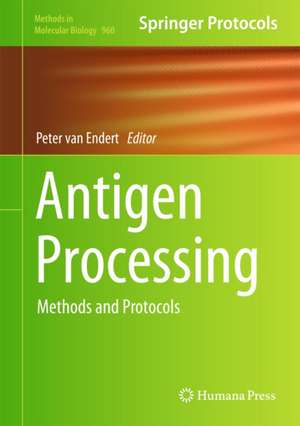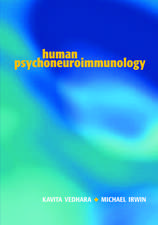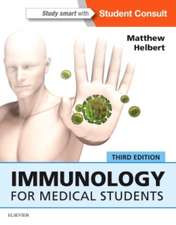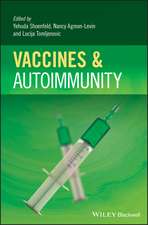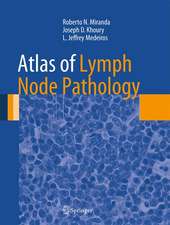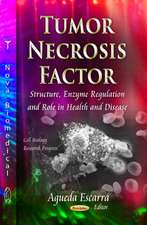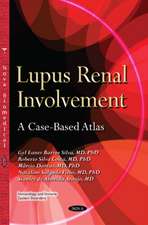Antigen Processing: Methods and Protocols: Methods in Molecular Biology, cartea 960
Editat de Peter van Enderten Limba Engleză Hardback – 18 ian 2013
Authoritative and practical, Antigen Processing: Methods and Protocols is designed for beginners and experts interested in studying antigen processing.
| Toate formatele și edițiile | Preț | Express |
|---|---|---|
| Paperback (2) | 738.80 lei 38-44 zile | |
| Springer – 14 aug 2020 | 738.80 lei 38-44 zile | |
| Humana Press Inc. – 23 aug 2016 | 1176.16 lei 43-57 zile | |
| Hardback (2) | 998.91 lei 38-44 zile | |
| Springer – 30 mai 2019 | 998.91 lei 38-44 zile | |
| Humana Press Inc. – 18 ian 2013 | 1442.26 lei 43-57 zile |
Din seria Methods in Molecular Biology
- 9%
 Preț: 791.59 lei
Preț: 791.59 lei - 23%
 Preț: 598.56 lei
Preț: 598.56 lei - 20%
 Preț: 882.95 lei
Preț: 882.95 lei -
 Preț: 252.04 lei
Preț: 252.04 lei - 5%
 Preț: 802.69 lei
Preț: 802.69 lei - 5%
 Preț: 729.61 lei
Preț: 729.61 lei - 5%
 Preț: 731.43 lei
Preț: 731.43 lei - 5%
 Preț: 741.30 lei
Preț: 741.30 lei - 5%
 Preț: 747.16 lei
Preț: 747.16 lei - 15%
 Preț: 663.45 lei
Preț: 663.45 lei - 18%
 Preț: 1025.34 lei
Preț: 1025.34 lei - 5%
 Preț: 734.57 lei
Preț: 734.57 lei - 18%
 Preț: 914.20 lei
Preț: 914.20 lei - 15%
 Preț: 664.61 lei
Preț: 664.61 lei - 15%
 Preț: 654.12 lei
Preț: 654.12 lei - 18%
 Preț: 1414.74 lei
Preț: 1414.74 lei - 5%
 Preț: 742.60 lei
Preț: 742.60 lei - 20%
 Preț: 821.63 lei
Preț: 821.63 lei - 18%
 Preț: 972.30 lei
Preț: 972.30 lei - 15%
 Preț: 660.49 lei
Preț: 660.49 lei - 5%
 Preț: 738.41 lei
Preț: 738.41 lei - 18%
 Preț: 984.92 lei
Preț: 984.92 lei - 5%
 Preț: 733.29 lei
Preț: 733.29 lei -
 Preț: 392.58 lei
Preț: 392.58 lei - 5%
 Preț: 746.26 lei
Preț: 746.26 lei - 18%
 Preț: 962.66 lei
Preț: 962.66 lei - 23%
 Preț: 860.21 lei
Preț: 860.21 lei - 15%
 Preț: 652.64 lei
Preț: 652.64 lei - 5%
 Preț: 1055.50 lei
Preț: 1055.50 lei - 23%
 Preț: 883.85 lei
Preț: 883.85 lei - 19%
 Preț: 491.88 lei
Preț: 491.88 lei - 5%
 Preț: 1038.84 lei
Preț: 1038.84 lei - 5%
 Preț: 524.15 lei
Preț: 524.15 lei - 18%
 Preț: 2122.34 lei
Preț: 2122.34 lei - 5%
 Preț: 1299.23 lei
Preț: 1299.23 lei - 5%
 Preț: 1339.10 lei
Preț: 1339.10 lei - 18%
 Preț: 1390.26 lei
Preț: 1390.26 lei - 18%
 Preț: 1395.63 lei
Preț: 1395.63 lei - 18%
 Preț: 1129.65 lei
Preț: 1129.65 lei - 18%
 Preț: 1408.26 lei
Preț: 1408.26 lei - 18%
 Preț: 1124.92 lei
Preț: 1124.92 lei - 18%
 Preț: 966.27 lei
Preț: 966.27 lei - 5%
 Preț: 1299.99 lei
Preț: 1299.99 lei - 5%
 Preț: 1108.51 lei
Preț: 1108.51 lei - 5%
 Preț: 983.72 lei
Preț: 983.72 lei - 5%
 Preț: 728.16 lei
Preț: 728.16 lei - 18%
 Preț: 1118.62 lei
Preț: 1118.62 lei - 18%
 Preț: 955.25 lei
Preț: 955.25 lei - 5%
 Preț: 1035.60 lei
Preț: 1035.60 lei - 18%
 Preț: 1400.35 lei
Preț: 1400.35 lei
Preț: 1442.26 lei
Preț vechi: 1518.16 lei
-5% Nou
Puncte Express: 2163
Preț estimativ în valută:
275.98€ • 288.87$ • 229.70£
275.98€ • 288.87$ • 229.70£
Carte tipărită la comandă
Livrare economică 31 martie-14 aprilie
Preluare comenzi: 021 569.72.76
Specificații
ISBN-13: 9781627032179
ISBN-10: 1627032177
Pagini: 608
Ilustrații: XVII, 589 p. 85 illus., 25 illus. in color.
Dimensiuni: 178 x 254 x 38 mm
Greutate: 1.23 kg
Ediția:2013
Editura: Humana Press Inc.
Colecția Humana
Seria Methods in Molecular Biology
Locul publicării:Totowa, NJ, United States
ISBN-10: 1627032177
Pagini: 608
Ilustrații: XVII, 589 p. 85 illus., 25 illus. in color.
Dimensiuni: 178 x 254 x 38 mm
Greutate: 1.23 kg
Ediția:2013
Editura: Humana Press Inc.
Colecția Humana
Seria Methods in Molecular Biology
Locul publicării:Totowa, NJ, United States
Public țintă
Professional/practitionerRecenzii
From the reviews:
“The book is divided into 42 chapters, each split into a short abstract, an introduction providing the relevant bibliographic overview, a detailed list of materials used in the protocol, a step-by-step description of the procedure, and a final section with notes. … Van Endert achieves what he set out to do – to provide an in-depth bench-side companion for antigen processing beginners and experts … . The book comes highly recommended.” (Clemens Hermann, Immunology News, February, 2014)
“The book is designed to be a benchside companion for researchers interested in studying antigen processing. It is intended for both beginners and experts studying antigen presentation.” (Omer Iqbal, Doody’s Book Reviews, August, 2013)
“The book is divided into 42 chapters, each split into a short abstract, an introduction providing the relevant bibliographic overview, a detailed list of materials used in the protocol, a step-by-step description of the procedure, and a final section with notes. … Van Endert achieves what he set out to do – to provide an in-depth bench-side companion for antigen processing beginners and experts … . The book comes highly recommended.” (Clemens Hermann, Immunology News, February, 2014)
“The book is designed to be a benchside companion for researchers interested in studying antigen processing. It is intended for both beginners and experts studying antigen presentation.” (Omer Iqbal, Doody’s Book Reviews, August, 2013)
Textul de pe ultima copertă
Antigen processing is a biological process that prepares antigens for the presentation to special cells in the immune system called T lymphocytes. In Antigen Processing: Methods and Protocols, expert researchers in the field provide a comprehensive set of protocols for studying presentation of antigens produced in the standard processing pathways for MHC class I and class II molecules. The chapters follow chronology of intracellular processing events, ending with recognition of peptide-MHC complexes at the cell surface by T lymphocytes. Written in the highly successful Methods in Molecular Biology™ series format, chapters include introductions to their respective topics, lists of the necessary materials and reagents, step-by-step, readily reproducible laboratory protocols, and key tips on troubleshooting and avoiding known pitfalls.
Authoritative and practical, Antigen Processing: Methods and Protocols is designed for beginners and experts interested in studying antigen processing.
Authoritative and practical, Antigen Processing: Methods and Protocols is designed for beginners and experts interested in studying antigen processing.
Caracteristici
Details comprehensive methods to study antigen presentation by classical and non-classical MHC proteins Provides step-by-step detail essential for reproducible results Contains key notes and implementation advice from the experts Includes supplementary material: sn.pub/extras
Cuprins
Purification of Large Cytosolic Proteases for In Vitro Assays: 20S and 26S Proteasomes.- Analysis of Proteasome Generated Antigenic Peptides by Mass Spectrometry.- Trimming of MHC Class I Ligands by ERAP Aminopeptidases.- Peptide Trimming for MHC Class I Presentation by Endoplasmic Reticulum Aminopeptidases.- Testing the Impact of Protease Inhibitors in Antigen Presentation Assays.- In Vitro Studies of MHC Class I Peptide Loading and Exchange.- Measuring Synthesis and Degradation of MHC Class I Molecules.- Biochemical Analysis of Naturally Processed Antigenic Peptides Presented by MHC Class I Molecules.- A SIINFEKL Based System to Measure MHC Class I Antigen Presentation Efficiency and Kinetics.- Purification and Identification of Naturally Presented MHC Class I and II Ligands.- Identification of MHC Ligands and Establishing MHC Class I Peptide Motifs.- Quantitating MHC Class I Ligand Production and Presentation using TCR-LikeAntibodies.- Identifying Antigens Recognized by Cytolytic T Lymphocytes on Tumors.- A Flow Cytometry-Based Approach to Unravel Viral Interference with the MHC Class I Antigen Processing and Presentation Pathway.- Evaluating CD8+ T Cell Responses In Vitro.- Recombinant Poxviruses: Versatile Tools for Immunological Assays.- Monitoring the Intracellular Routing of Internalized Antigens by Immunofluorescence Microscopy.- Monitoring MHC Ubiquitination by MARCH Ubiquitin Ligases.- Monitoring MHC-II Endocytosis and Recycling using Cell-Surface Protein Biotinylation-Based Assays.- Monitoring Protein Endocytosis and Recycling using FACS-Based Assays.- In Vitro Digestion with Proteases Producing MHC Class II Ligands.- Assembly, Intracellular Transport and Release of MHC Class II Peptide Receptors.- Pulse-Chase Analysis for Studies of MHC Class II Biosynthesis, Maturation, and Peptide Loading.- Studying MHC Class II Peptide Loading andEditing In Vitro.- Monitoring Antigen Processing for MHC Presentation via Macroautophagy.- Identification of Human Antigen-Specific CD4+ T-Cells with Peptide-MHC Multimer Technologies.- Production of Antigen Specific Human CD4+ T Cell Lines and Clones.- Monitoring Dendritic Cell Activation and Maturation.- Studying MHC Class II Presentation of Immobilized Antigen by B Lymphocytes.- Analyzing Antigen Recognition by Natural Killer T Cells.
